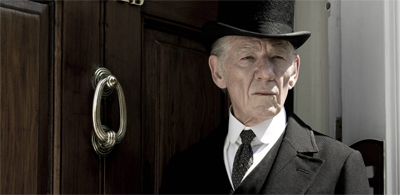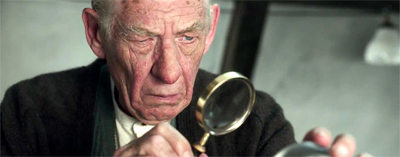Memory is a tricky thing, particularly as distinct from history. History often occurs as a sequence of events, a laundry list and cause and effect and happenstance. Memory is the chord that we use to tie that all together, the narrative that we weave through these isolated events. Mr. Holmes is an exploration of the gulf as it exists between the two concepts, following an ageing Sherlock Holmes as he attempts to piece together his own faded memory from facts and evidence scattered around.
Adapted from Mitch Cullin’s A Slight Trick of the Mind, writer Jeffrey Hatcher and director Bill Condon position Holmes’ famous deductive prowess as a clever metaphor. Holmes’ ability to effortless build random strands of information into cohesive theories and explanations is set against two rather unconventional targets. As his faculties begin to fail him, Holmes tries to reconstruct memory from the few details available to him. At the same time, Holmes struggles with his own difficulties understanding human nature as it exists beneath these subtle hints and clues.
Although the publication of A Slight Trick of the Mind predates the development of Steven Moffat and Mark Gatiss’ cult adaptation Sherlock, there is considerable thematic overlap between both stories. As with the BBC series, it seems like the Sherlock Holmes of Mr. Holmes is more concerned with the mystery that is other people than with any individual case. The result is a surprisingly (and effectively) low key film that plays more as a meditation on the human condition than as a convention Sherlock Holmes mystery.
There are points where Mr. Holmes does feel a little too heavy-handed or a little too manipulative in its exploration of the eponymous character. However, Condon very clever grounds the film in a beautifully vulnerable central performance from Ian McKellen.
Those looking for a conventional Sherlock Holmes mystery might be better suited to look elsewhere. Then again, one of the great ironies of the contemporary boom in Sherlock Holmes stories is the fact that there are relatively few pulp mystery stories starring the character. It seems like the vast majority of contemporary reimaginings of Sherlock Holmes are more fascinated by their subject than by the cases that he solves. It is fascinating that the character of Holmes has endured more than the stories told around him.
Mr. Holmes makes dutiful reference to the Holmes canon. After one unfortunate accident, Holmes observes, “I look like I was mauled by the hound of the Baskervilles.” In his later years, Holmes decides to spend his time bee-keeping, perhaps a reference to H.F. Heard’s A Taste for Honey, the first story about Holmes’ retirement published in 1941. However, this not a typical Holmesian narrative. In fact, at one point, Holmes himself attends a cinema screening of a more traditional cinematic adaptation of the story’s central mystery – deerstalker and all.
Instead, Mr. Holmes is a reflection on age and mortality. Over ninety years old, Holmes finds himself living with just his housekeeper and her young son. Diagnosed with senility, Holmes faces the prospect of losing the mental skills that made him the world’s greatest detective. At the same time, he finds himself wrestling with guilt over his last case. Isolated from the larger world, Holmes struggles to remember why he retired; what sequence of events might have forced him to give up his profession.
One of the more interesting creative choices in Mr. Holmes is the decision to sideline the character of Watson almost entirely. In his recollections, Holmes observes that Watson had retired shortly before he took on that fateful case. Although there is a flashback sequence that does feature Watson, Condon is careful to shoot the scene so that Watson haunts the edge of the frame. The viewer (and Holmes) are invited to wonder whether that last case might have gone so wrong precisely because of Watson’s absence; was the good doctor a tether to humanity for the ace detective?
Jeffrey Hatcher’s script perhaps over-stretches itself here. Watson is one of the great literary devices, a prism through which the audience might view Holmes and a humanising force in a series of mysteries that might otherwise seem academic or removed. As originally imagined by Sir Arthur Conan Doyle, Sherlock Holmes was detached and disengaged; he could seem superhuman or inhuman. Mr. Holmes plays with this idea, suggesting that Holmes’ understanding of cause and effect is not matched by an insight into human nature.
The problem is that the script seems afraid to commit to itself. Much of Mr. Holmes hinges on the idea that the central character has trouble relating to people, but the film never seems entirely consistent in its portrayal. There is no awkwardness in the interactions between Holmes and his housekeeper’s young son. While this relationship is intended to humanise Holmes, providing a contrast with his detachment elsewhere, the script feels forced. We get to know “Holmes the surrogate father” before the film presents “Holmes the dispassionate detective.”
Still it is a minor problem in an otherwise effective film. Mr. Holmes is set across three different time periods, jumping back and forth in a manner that suggests the arbitrary nature of memory – links formed by emotional associations more than logical progressions. Two of those periods are in the immediate aftermath of the Second World War; the third is in the wake of the First World War. Mr. Holmes gets a great deal of mileage by confronting an iconic Victorian character with a radically-changing world.
The imagery is not subtle, but is certainly suggestive. As Holmes tends to his bees after the end of the Second World War, he discovers that the hive is dying. It initially appears to be some sort of premature colony collapse disorder, as if to suggest that the social order is breaking down. The queen no longer commands absolute authority, the colonies might be lost. This metaphorical transition is also marked with a visit to Hiroshima after the end of the Second World War. Holmes gets to live long enough to see two great imperial powers fade into history.
Mr. Holmes suggests more than it actually says, but that might be a good thing. Bill Condon worked with Ian McKellen on Gods and Monsters, and he clearly appreciates the talent of his leading actor. Mr. Holmes hinges on a beautifully vulnerable central performance from McKellen as the ageing detective. McKellen provides an incredible dignity to a character who is struggling against the ravages of age and the associated existential crises. McKellen conveys so much with only a slight turn of phrase or a subtle facial tic.
McKellen is offered sterling support from Laura Linney as Misses Munro, his housekeeper. Munro is a character who exists quite distinct from the world of mystery and knowledge promised by Holmes. While the film suggests that Holmes’ involvement with the Second World War involved little more than consultations with Mycroft in fancy rooms of lavish clubs, Misses Munro has been affected and changed by the trauma of the conflict. She exists in a world more real than that of her employer. Milo Parker does great work as her son Robert.
Mr. Holmes is perhaps a typically atypical Sherlock Holmes story, a tale reflecting the modern fascination with Holmes as the character suggested by Doyle’s narratives more than as a vehicle to mystery and adventure. McKellen’s Holmes feels like a more sombre (and, yes, mature) version of the human iterations of Holmes who populate contemporary adaptations like Sherlock and Elementary and House. The central mystery at the heart of Mr. Holmes is all too human.
Filed under: Non-Review Reviews | Tagged: Bill Condon, film, Holmes, ian mckellen, Movie, mr. holmes, mystery, non-review review, review, Sherlock, sherlock holmes |



























Is a film where they try to explore Holmes’ childhood and personal background? LIke The Seven Percent Solution?
Not so much.
It’s not really about his history, beyond that last case. It’s much more about the idea of Holmes as a human being rather than a character and his interaction with other characters as human beings rather than as cogs in some mystery.